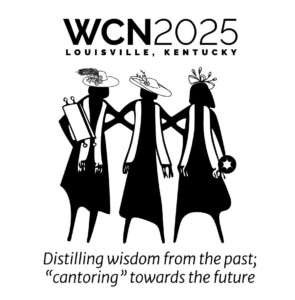Copyright Policy: Women Cantors’ Network
April 2015
UPDATE 2025 The WCN is a JLicense holder.
The WCN is an organization that respects music and musicians and composers. It is our responsibility as carriers of Jewish music traditions to adhere to both the letter of the civil law, as well as Torah law, when it comes to copyright. The following are the rules for music usage, sharing and performance:
Part I: Copyright Rules at Conferences:
Written Music:
Permission to use music at the conferences is required. This includes at T’filah, unless the piece is in public domain. The individual composer or arranger will let you know if they require licensing and fees.
All music that is disseminated at the WCN Conference and must be clearly labeled: “WCN – For one-time use only. Copying not permitted.”
Note: this goes for written music and for chord/guitar tablature, as well as well as electronic sharing: overhead/power point presentations, tablets or any electronic or digitized forms. This is solely the responsibility of the person sharing the music at a conference in any form: worship, sessions/workshops or song/niggun share.
In addition, post-conference, none of the written music may be copied, re-used, shared, posted, given away or sent in any form without express written permission of the composer/arranger. Again, the onus falls to the person presenting/performing the piece of music.
Conference Concert performances:
Due diligence must be used in obtaining permission and licensing, if required, by the composer/arranger, to sing a piece in concert or performance – whether or not a fee is charged for attendance.
T’filah/Worship Services:
Singing at a worship service falls under Fair Use for churches and only the performance of the music is covered, not a song sheet with lyrics only, or a power point, or other electronic use. Permission/licensing (as above) is required for pieces that are used under other conditions. Under Fair Use law, you may make a copy for an accompanist, but that copy is not allowed to be used again after the performance.
Streaming:
The laws regarding streaming are very complex and are changing constantly. As we do not have a clearinghouse (such as BMI or ASCAP) that polices and pays Jewish composers, it is recommended that we do not stream anything at the conference. Legal experts are divided on this, and, in the absence of a clear mandate, our tradition calls on us to be cautious, and err on the side of NOT stealing someone’s work.
Note: Fair Use covers only “brick and mortar” performances – in the actual building of the worship service. Once it leaves the building (via the web, for example), no matter whether you are making money or not, you are breaking copyright law. The lack of money changing hands does not negate the fact that you cannot broadcast, disseminate or share music that you do not own the copyright to.
Part II: List-Serve and Sharing:
“Does anyone have a copy of…?”
It is against the law to give someone else music that is not yours. Period. We have many resources at the WCN, and requests for music can and should be followed up with links to these resources: “Hey, I love and use So-and-So’s V’shamru. Here is how you can reach her,” or “you can find it on OySongs or with Hal Leonard or HaZamir Publications…” or hundreds of others. Requesting chords to a song, without requesting written music should be handled on a case-by-case basis. Please use your discretion. Ideally, all requests should be forwarded directly to the composer or publishing company.
“My office was just moved and I have in it a box, but can’t find it and I need it by tonight!”
Again, please use your discretion – if they already own it, it falls under Fair Use.
The easiest law to remember: If you don’t own it, you can’t share it. Go directly to the composer/arranger – most in the Jewish music world are overjoyed to share! Adrian Durlester is compiling a list of composers and publishers that he is happy to share with the WCN at a future date.
Respectfully submitted,
Robbi Sherwin
Women Cantors’ Network

